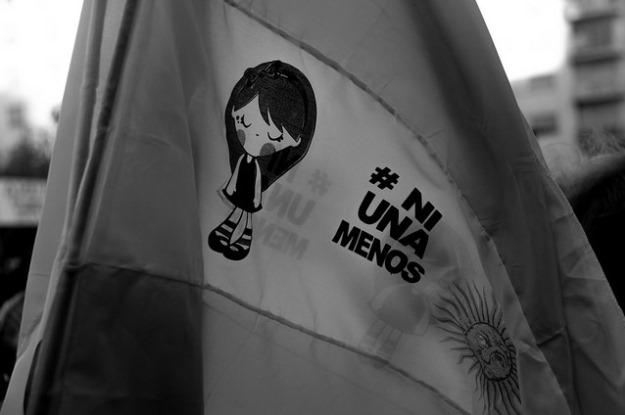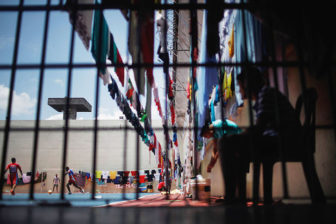Isamara Filier, 41, was at a New Year’s party in Campinas, Brazil when her ex-husband opened fire on partygoers, killing her and eleven others. Filier and her ex-husband had been fighting for custody of their eight-year-old son, who was also among those killed.
Hours later in El Alto, Bolivia, Jenny Mamani, 21, was beaten to death by a drunk and jealous boyfriend shortly after ringing in the New Year. Around the same time in Pacora, Panama, Jessica Flores, 30, was strangled to death by her former partner.
Just a day into 2017, and already Filier, Mamani and Flores – and others like them – had been added to the list of thousands of women in Latin America who are killed each year in what were once called crimes of passion, but are today more accurately termed “femicides” – the murder of females because of their gender.
Their deaths were not outliers. In fact, trafficking activity, high levels of impunity and entrenched negative attitudes toward women have given Latin America some of the highest rates of femicide in the world. The U.N. Economic Commission for Latin America and the Caribbean (ECLAC) reported that in 2014, 1,678 women in the region were killed as a result of gender-based violence.
Governments in the region have tried to respond to the epidemic – with varying degrees of success. While legislation alone can’t put an end to these crimes, many governments in Latin America have sought to further protect women by stiffening laws against domestic violence and passing measures to address femicide specifically.
Below is a country-by-country breakdown of many of those efforts (all data as of December 2016), along with reminders of the work still left to be done.
Argentina
Law 26.791, passed in 2012, categorizes femicide as aggravated homicide punishable by 8 to 25 years in jail. The legislation was spurred by a 20 percent increase in femicides over the year leading up to the vote, and passed unanimously through Congress. Despite strong legislation, the problem persists; last October tens of thousands of women marched in protest of violence against women under the banner of the #NiUnaMenos awareness campaign, which started in Argentina.
Bolivia
Law 348, called the Comprehensive Law to Guarantee Women a Life Free of Violence, was passed in 2013 and made femicide punishable by up to 30 years of prison with no right to parole. Bolivia has one of the highest rates of domestic violence and violence against women in the region, and femicides are on the rise – between 2013 and 2015 there were an estimated 250 femicides, and since passing the legislation 47 people have been convicted and sentenced for the crime.
Brazil
Law 13.104, passed in 2015, criminalizes femicide with 12 to 30 years in prison. This legislation adds on to a prior law called the “Maria da Penha Law,” passed in Sept. 2006, which recognized abuse against women and increased penalties for domestic violence. The law was named after a Brazilian woman who was beaten, almost killed, and made paraplegic by her husband. Last month, the Patrícia Galvão Institute, a Brazilian non-profit, launched the Femicide Dossier project, which aggregates information on femicide.
Chile
Law 20.480, passed in 2010, includes the longest maximum prison sentence for femicide in the Americas, ranging from 15 years to life imprisonment. Under the current legislation, in order to be convicted of femicide, the perpetrator has to have been the spouse or cohabiting partner of the woman. However, on November 21, 2016, President Michelle Bachelet sent Congress a bill that would expand the existing femicide law to include boyfriends and partners that do not live together.
Colombia
Law 1761, also known as the Rosa Elvira Cely Law, was passed in 2015 and criminalizes femicide with a jail sentence of 20 to 41 years. The law was named in honor of a 35-year-old single mother who was killed in 2012. In June 2016, the Colombian attorney general’s office issued a warning that a femicide occurs in Colombia once every three days.
Costa Rica
Law 8.589, the first law specifically against femicide in Latin America, was passed in 2007. Perpetrators can face 25 to 30 years in jail.
Cuba
While some articles in Cuban legislation refer to gender equality, there are no specific laws against femicide.
Dominican Republic
Femicide became part of the penal code in Article 100 of Law 550/14, which was enacted in 2014. Perpetrators can be sentenced to 30 to 40 years in prison. In November 2016, the Dominican Republic’s attorney general’s office announced a comprehensive action plan in an attempt to further prevent violence against women. The plan would not only punish perpetrators of gender violence, but begin a prevention program.
Ecuador
Articles 141 and 142 in the Organic Integral Penal Code (COIP), enacted in 2014, recognize femicide as a crime with a jail sentence of 22 to 26 years. On Nov. 25, 2016, the International Day for the Elimination of Violence Against Women, Ecuadoreans held a memorial to pay homage to the victims of femicide. Between 2014 and 2015 there were 188 registered violent deaths of women in Ecuador.
El Salvador
Law 520, named the Comprehensive Special Law for a Life Free of Violence for Women, was issued in 2010 and made femicide punishable by 20 to 35 years in jail. Gender violence is especially common in the small country of 6.3 million people, where 284 femicides were registered between January and November of 2016. According to a recent survey, El Salvador has the highest rates of femicide in the world.
Guatemala
Decree 22-2008, passed in 2008, establishes legislation against femicide and other forms of violence against women. If convicted, perpetrators can face 25 to 50 years in prison. Despite being an early enactor of femicide legislation in the region, violence against women continues in the country; in a study done early in 2016, femicide ranked as the third most common criminal cause of death after manslaughter and murder.
Haiti
There are currently no laws specifically addressing femicide.
Honduras
Article 118-A of Decree 23-2013, issued in 2013, criminalizes femicide with a sentence of 30 to 40 years in jail. Despite legislation, violent deaths of women are on the rise in Honduras, increasing to 540 between January and June of 2016.
Mexico
A 2012 decree criminalizes femicide with a sentence of 40 to 60 years in prison – the second longest sentence in the region after Chile. Femicides and the killing of women have been increasing in Mexico precipitously. The number of women killed between 2013 and 2015 was seven times the number of female deaths between 2011 and 2013. Three thousand women were killed between January and October 2016, 1,185 of which were classified as femicides.
Nicaragua
Article 9 of Law 779, enacted in 2012, criminalizes femicide with a maximum sentence of 30 years in prison. In a recent court hearing in Matagalpa, Nicaragua, the head of the First District Court sentenced a man to 33 years and three months – although he can only serve the maximum 30 years – for admitting to stabbing his 23-year-old girlfriend 17 times.
Panama
Law 82, enacted in 2013, criminalizes femicide with a sentence of up to 30 years. The regional office of the U.N. Women for the Americas and Caribbean in partnership with the Pan American Health Organization and the Initiative for Research on Sexual Violence (SVRI) hosted an event in Panama in early December 2016 to discuss the prevention of violence against women and girls. On Dec. 12, the National Women’s Institute announced a plan of action for equality for women in Panama, which included encouraging women to report cases of domestic violence and femicide.
Paraguay
A bill was introduced in August 2016, which would add upon existing legislation – Law 1.600 against domestic violence – and criminalize femicide, resulting in a jail sentence of up to 30 years.
Peru
Law 30.068 criminalizing femicide, enacted in 2013, was incorporated into the criminal code and carries a sentence of 15 to 25 years. Between January and November of 2016 there was a 13 percent increase of femicides compared with the previous year; a majority of Peruvians believe that over the past five years violence against women has increased substantially.
Uruguay
At the end of 2015, President Tabaré Vázquez signed a bill to criminalize femicide through a modification of Article 312 of the penal code, classifying it as an aggravated homicide.
Venezuela
A reform to the Law for Rights of Women to a Life Free of Violence in Official Gazette 40.548, published in 2014, classifies femicide as a felony and carries a sentence of 25 to 30 years in prison. Of the 353 murders of women registered in 2015 in Venezuela, 15 percent of the victims were between the ages 15 to 30.
—
Bintrim is an editor for AQ








